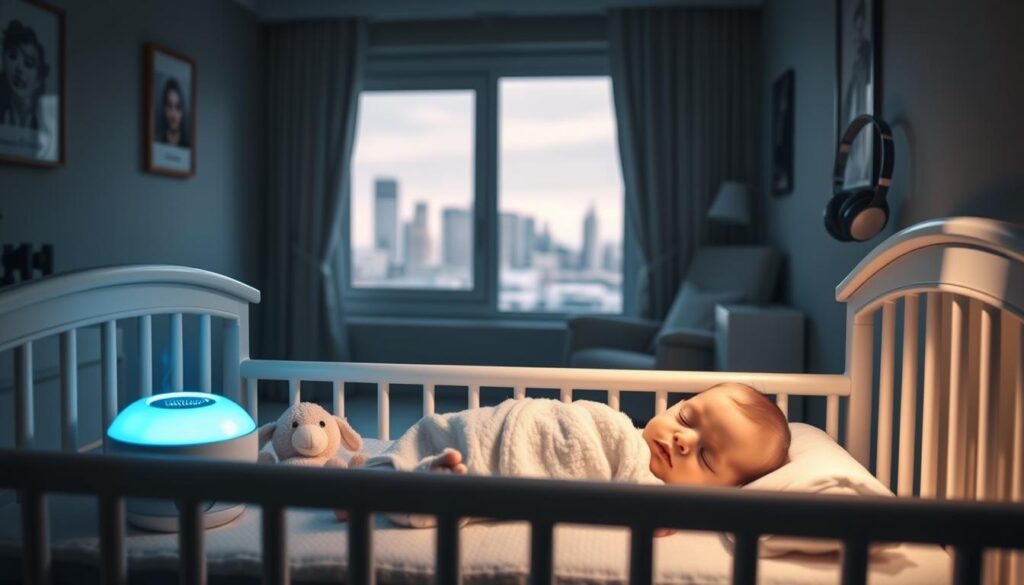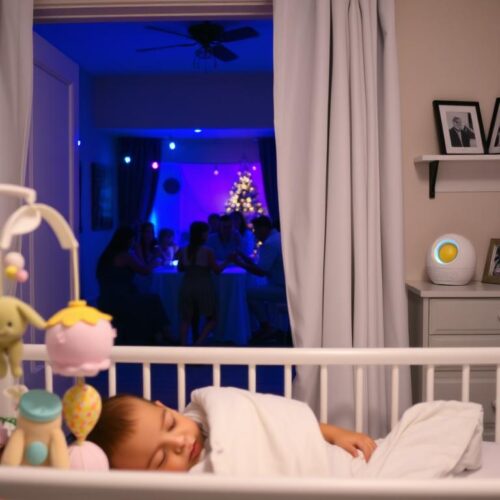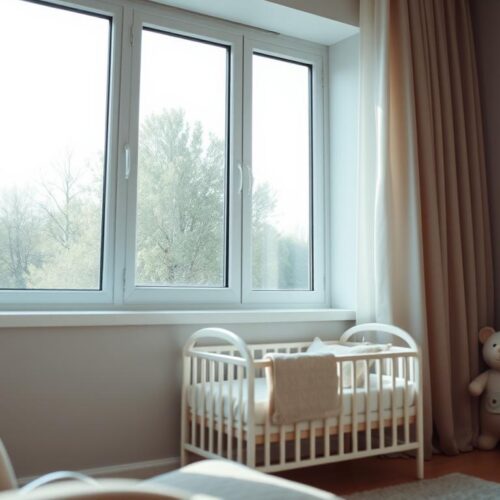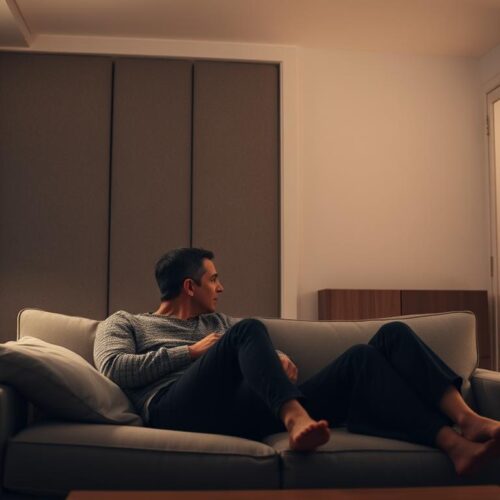Today’s busy cities can make it hard for your baby to sleep well. Understanding the problems caused by loud sounds is important. This article gives tips on how to keep your baby’s sleep calm, even with city noise all around.
The Importance of Sleep for Babies
Sleep is very important for your baby’s health. It helps their body and mind grow strong. A baby who gets enough sleep is happier and learns better.
How sleep affects growth and development
Your baby needs good sleep to grow well. While they are in deep sleep, their body releases growth hormones. This helps them to grow and gain weight.
If they don’t sleep enough, it might slow down their growth. It could also make it harder for them to learn and remember things.
The role of uninterrupted rest in brain function
Babies need unbroken sleep for their brains to work best. They learn and remember new things while they sleep. This sets up their ability to learn later on.
Enough sleep also helps babies manage their emotions. Without it, they may get cranky and find it hard to pay attention when they are awake.
Creating a good sleeping spot is key for your baby’s development. Both how well and how long they sleep matter a lot.
Understanding Urban Noise and Its Impact on Sleep
Living in the city brings challenges, especially noise. Traffic, construction, and nightlife noises can disturb sleep, especially in babies. An analysis reveals that 40% of people in the European Union risk health issues from constant noise exposure.
Types of urban noise: traffic, construction, and more
Knowing the common urban noises helps understand their effect on infant sleep. The main sources include:
- Traffic noise from cars, buses, and trucks
- Construction sites, often generating loud machinery sounds
- Nightlife activities, including music and social gatherings
- Public transportation, such as trains and subways
Statistics on noise pollution in urban areas
Statistics on noise pollution offer a stark view of urban sound environments. Such noise can seriously affect infants’ sleep.
| Noise Source | Percentage of Noise Contribution | Common Effects on Infants |
|---|---|---|
| Traffic | 60% | Frequent awakenings |
| Construction | 25% | Disrupted sleep cycles |
| Nightlife | 10% | Increased irritability |
| Public Transportation | 5% | Difficulty in achieving deep sleep |
Noise Pollution Effects on Infants
Recent studies have highlighted how city noise deeply affects infants, especially their sleep. Noise pollution leads to various sleep issues. It’s vital to know how sound exposure impacts their health.
Research linking noise exposure to sleep problems
Studies make it clear that high noise levels are linked to infants’ sleep problems. Noise makes it hard for them to fall asleep and keeps waking them up. These sleep issues can mess with their daily life and growth. With city noise everywhere, it’s key for families to tackle its impact on babies’ sleep.
Gender differences in sensitivity to noise
Looking into how boys and girls react differently to noise brings up some interesting points. Studies have found that girls might be more sensitive to noise. This can lead to bigger sleep problems in infant girls than in boys. Knowing these differences can guide parents on how to better manage noise around their babies.
How Noise Impacts Baby Sleep Quality
It’s key to know how noise affects sleep quality for infants to ensure they get good rest. Infants have lighter sleep cycles than adults. So, they’re more likely to wake up due to noise. Understanding this helps in creating a calm sleep environment for them.
Light sleep cycles in infants
Infants spend more time in light sleep and less in deep sleep. This makes them wake up easily from noises. Studies show that waking up often can mess with their sleep and affect their mood and behavior. Keeping their surroundings quiet is crucial for their sleep quality.
The relationship between noise levels and disturbances
Loud noises in the city can lead to babies waking up often at night. Sudden loud sounds disturb their sleep cycle, causing them to wake up many times. Lowering noise at home can significantly improve their sleep. This means they’ll be less fussy during the day.
Creating a Loud-Free Nursery Environment
A well-thought-out nursery means your baby sleeps well, even in the city. It’s key to make the room quiet for better sleep. By using special design tricks, you can make a peaceful nursery. This stops loud sounds from waking your baby.
Essential soundproofing strategies for nurseries
- Upgrade your window treatments with soundproof curtains or double-glazed windows to significantly reduce outdoor noise.
- Incorporate acoustic panels on the walls to absorb sound and minimize echo within the room.
- Add soft furnishings, such as rugs and plush toys, which can help to dampen noise levels and create a warmer atmosphere.
- Seal gaps around doors and windows with weatherstripping or caulk to block unwanted sounds from infiltrating the space.
Importance of nursery layout and design
Arranging furniture smartly makes the nursery quiet for sleeping. Keep the crib away from windows and walls to lower noise. A clean, simple room helps your baby relax and sleep deep. A neat, pretty room also adds calm and peace.
Soundproofing Techniques for Baby Rooms
A peaceful space is crucial for your baby, especially where there’s a lot of noise. Using soundproofing methods in the nursery can help your baby sleep better.
Effective window treatments to block sound
Window treatments are key to reducing noise in your baby’s room. Acoustic curtains are great as they soak up sound. You could also use window inserts to keep outside noise away. Both options help make the nursery quieter, aiding your baby’s sleep.
Sealing gaps and cracks for noise reduction
It’s important to seal any gaps and cracks around windows and doors. You can use weatherstripping or acoustic caulk to stop noise from getting in. Below is a table that shows different ways to seal these gaps:
| Sealing Method | Description | Effectiveness |
|---|---|---|
| Weatherstripping | Flexible material that fills gaps around windows and doors. | High |
| Acoustic Caulk | Specialized caulk designed for soundproofing. | Very High |
| Foam Tape | Adhesive tape used to seal small cracks. | Moderate |
Using the right window treatments and sealing methods can really improve your baby’s room. This creates a quiet, restful place for your baby.
Managing Urban Noise for Infant Sleep
Living in a city often means dealing with lots of noise. This noise can wake your baby up. To give your baby calm sleep, it’s key to know how to handle this noise. Using gadgets like white noise machines helps a lot in this.
Using white noise machines and sound machines
White noise machines help by making a steady sound. This sound covers up loud noises from things like cars or construction. These machines create a soft sound that can help your baby sleep better. They make it easier for your baby to stay asleep by blocking unexpected noises.
Creating calming bedtimes amidst noise
Having a calming bedtime routine helps lessen stress, even with noise around. This routine can have things like rocking, playing soft music, or reading stories. It shows your baby it’s time to sleep, no matter the noise outside. Using sound machines with these habits helps make a quiet sleep space for your baby.
Tips to Reduce Noise for Better Baby Sleep
Making your home quieter can help your baby sleep better. A few changes around the house can make a big difference in sleep quality.
Implementing simple home modifications
Think about getting thick curtains to lessen outside noise. These curtains do more than block light; they also keep sounds out. This helps make the nursery calmer. Adding rugs or carpets can mute sounds even more. If you move the crib away from windows or walls next to noisy areas, it might keep noise away from your baby.
Minimizing environmental disruptions
Set up quiet times during your baby’s sleep hours. Plan when to do loud chores, like vacuuming, so they don’t disturb your baby’s naps. Ask your family to stay quiet during early mornings or late nights to help your baby sleep. These steps will make your home more peaceful for your baby’s rest.

Importance of Noise Reduction for Baby Sleeping Habits
Reducing noise is crucial for babies to sleep well. Loud noises can break the sleep cycles that babies need to stay healthy. Good sleep boosts mood, brain growth, and body development in kids. It’s important to make a quiet space where your baby can sleep deeply.
Connection between quality sleep and long-term health
Studies show that not sleeping enough can lead to problems as kids grow. Noise can keep babies from sleeping soundly, leading to trouble with emotions and behavior later. Using ways to lower noise can help your baby sleep better, which is good for their health and happiness.
Indicators of poor sleep habits in infants
It’s important for parents to notice signs of bad sleep. Early warnings include:
- Frequent waking during the night
- Hard time settling at bedtime
- Being extra cranky during the day
- Sleeping for only short periods
These signs mean you might need to lower noise to improve sleep. Things like making the room quieter, calming bedtime activities, and setting up the room well can make a big difference. This helps your baby sleep well and grow up healthy.
Professional Soundproofing Solutions for Maximum Results
Making a quiet space for your baby often goes beyond simple at-home fixes. Getting help from soundproofing experts meets your special needs with custom solutions that last. They do in-depth sound checks, making sure your baby’s room stays quiet from outside noise.
Consulting experts for acoustic assessments
Talking to soundproofing experts lets them check your space’s sound setup. They find where sound might sneak in and suggest the best fixes. This expert advice helps pick the right soundproofing stuff and ways to keep your baby safe and sound.
Long-term benefits of professional soundproofing
Paying for pro soundproofing has lasting perks. It cuts down on noise pollution, helping your child sleep better. Safe, well-done soundproofing makes a healthier nursery. You’ll likely see better sleep patterns in your baby, good for their growth and happiness.
Choosing Baby-Safe Soundproofing Materials
When you’re making your nursery peaceful, it’s key to pick the right soundproofing stuff. It’s not just about cutting down on noise. You need to make sure they’re safe for your baby. These materials help your child breathe fresh air and enjoy calmness.
Health considerations when selecting materials
Picking materials that are safe and chemical-free is crucial. Parents look for materials that are proven safe. For example, natural latex and organic cotton both lessen noise and keep the air healthy. Steer clear of products with volatile organic compounds (VOCs), as they can harm your baby’s health.
Eco-friendly options for soundproofing
Choosing eco-friendly soundproofing does more than just lower noise. It also looks after our planet. Wool insulation, reclaimed wood, and fabric solutions are great for sound and the Earth. They help keep your baby’s room both quiet and safe. Going green with soundproofing means caring for your baby’s future and the world they’ll grow up in.
Creating a Sleep Routine Amidst Urban Noise
Creating a sleep routine in the city is hard but vital for babies’ sleep. The city’s bustle makes it tricky to find peace. To help, there are effective ways to make bedtime calm.
Balancing urban life with a peaceful sleeping environment
To mix city life and sleep, know the value of a calm space. Making small changes can really help sleep. For example:
- Using blackout curtains to limit light exposure.
- Incorporating soft furnishings like rugs and cushions to absorb sound.
- Utilizing gentle background noise, such as white noise machines, to mask disruptive urban sounds.
Establishing a consistent pre-sleep routine
Bedtime rituals show infants it’s time to sleep. Reading or soft music helps them link these to sleep. Being consistent is key to make this work.
- Dimming the lights to say day’s over.
- Doing quiet things to wind down.
- Sticking to a set bedtime to make sleep predictable.

With these calming steps and managing city noise, you can set a soothing sleep routine. This helps your baby sleep well, even with the noise outside.
Real-Life Examples of Successful Soundproofing
Parents in cities face special challenges to ensure their babies sleep well. Through successful soundproofing stories, they learn how to deal with noise. These stories show different ways to reduce noise, from big renovations to simple, cheap steps.
Case studies of families in noisy environments
Many families share how they made their homes quieter. For example, one family near busy streets used double glazing. This cut down a lot of street noise and helped their baby sleep better. Another family put acoustic panels in their nursery walls. This shows small changes can make a big difference. These stories teach us about different soundproofing methods.
Best practices learned from urban soundproofing
From these stories, we learn the best ways to soundproof in the city. Using thick curtains or soundproof shades can block a lot of noise without big changes. Sealing up gaps in doors and windows is another easy way to keep noise out. These success stories show that practical solutions are available for every parent.
Conclusion
Living in a city can make it hard to find a quiet spot for your baby to sleep. Traffic, construction, and city noise can interrupt their rest. This can affect their growth and learning. But, by learning about urban noise and sleep, you can make their sleep area calm.
Using soundproofing ways and white noise can help. This makes a peaceful place even in loud neighborhoods. By checking where your baby sleeps and making changes, you can help them sleep better. This helps them grow and develop even with city noise around.
Knowing how city sound affects sleep and solving it with specific ways can improve sleep habits. Work on these methods, and see your baby sleep more peacefully. This is key for their good growth and happy development.




